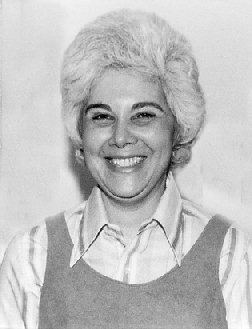FLORENCE FISHMAN

There are many appropriate words to describe Florence Fishman, but none more accurate than the phrase "a person actively engaged in promoting human welfare."
Florence's preparation for a career of helping others began when she reached young adulthood. She enrolled in Brooklyn College commuting every day from her home in New York City. After earning a Bachelor or Arts degree there, she went on to Columbia Teachers College to receive a master's degree in Early Childhood Education. Later she earned a second master's degree in Counseling and a third in Reading.
It was at this time that Florence, her physician husband, and two sons arrived in Philadelphia; however, Mrs. Fishman's career at Community College did not begin until the year 1969. She was hired as a part-time teacher in the English department where she taught reading and study skills. She also held workshops for students in the nursing program. The workshops were an innovative idea and were held wherever space was available.
In 1970, Florence was hired as a counselor at the College. In 1973, a task force was formed to develop learning skills for students. The members of the task force were impressed with this counselor's work with students and recommended that she be asked to found and coordinate the Learning Lab. Mrs. Fishman became the first coordinator of the Lab. She began with only a few tutors to assist her. Sincere dedication and caring were the primary ingredients of the Lab; students and faculty supported the Lab through the efforts of the new coordinator.
Albert Schweitzer once defined humanism as "making the full growth of oneself and one's fellow beings the supreme goal of living." Florence was indeed involved in growth; her innate capacity for sharing and giving was based on a deep respect for human need and potential. She felt that even the most humble person had an invaluable worth. Nationality, religion, ethnic group, or color never represented obstacles to her; she believed as Goethe did, "above the nations is humanity."
As a caring person, Florence realized that human beings were not meant to live estranged existences; rather, we must share our lives and our abilities with others in order to become more finely human. Morally, she knew that each of us has a debt to humanity, an obligation that requires rendering. If one does not fulfill one's moral debt, society could be deprived of an unthinkable waste of potentialities in terms of individual growth, learning, and creativity. Her ideas were progressive, but she never stopped being concerned about the feelings of others. She was truly interested in the person as a person. A very close friend of hers has said, "Florence had the rare ability to make each of us feel we were the only person in the world who mattered when we were with her, and each of us did matter."
Florence Fishman loved beauty and she found it everywhere around her. Arts and classical music gave her great joy, but the beauty she consistently discovered in others gave her the most joy of all. More correctly, she brought out the inner beauty from everyone whom she touched.
She never sought personal gain and shunned credit for her deeds, but in 1977 her colleagues chose her to be the recipient of the prestigious Lindbach Award for excellence in teaching. She proudly but humbly accepted. Shortly afterwards, she was appointed to a full professorship at Community College; honor and prestige were hers, but she remained the same people-loving person she had always been.
Florence made many other lasting contributions. She gave support to Project II in its infancy, and current placement policies are an outgrowth of her initial efforts. An admirer has used the term "others-oriented" in describing Mrs. Fishman; her accomplishments verify that description.
There are those who would say that Florence was almost perfect; she would not agree with that and would not wish to be labeled as such. She encouraged others to self-accept and made one aware that it was all right and sometimes even necessary to fumble or make mistakes; errors are going to occur in our search for growth; imperfection is a major part of being human.
This extraordinary woman died on August 11, 1978, after a prolonged illness. In her memory, the administration, faculty, alumnae, and students of Community College of Philadelphia have established the Florence Fishman Humanitarian Award for Outstanding Services by a Tutor. It is a great honor to be nominated for this award and an even greater honor to be a recipient.
The Learning Lab is a standing reminder of how much Professor Fishman cared about the progress and well being of all students. The Lab provides for a more individualized situation where tutors are given an opportunity to touch the lives of fellow students in a manner unlike any other they have known or may ever know again.
Community College benefited greatly during the eight years Florence Fishman spent here. Other people whose lives she touched feel that they, too, were lucky because she gave them something of immeasurable value: a positive formula for life that enables one to distinguish the vast difference between the act of existing and the art of living.